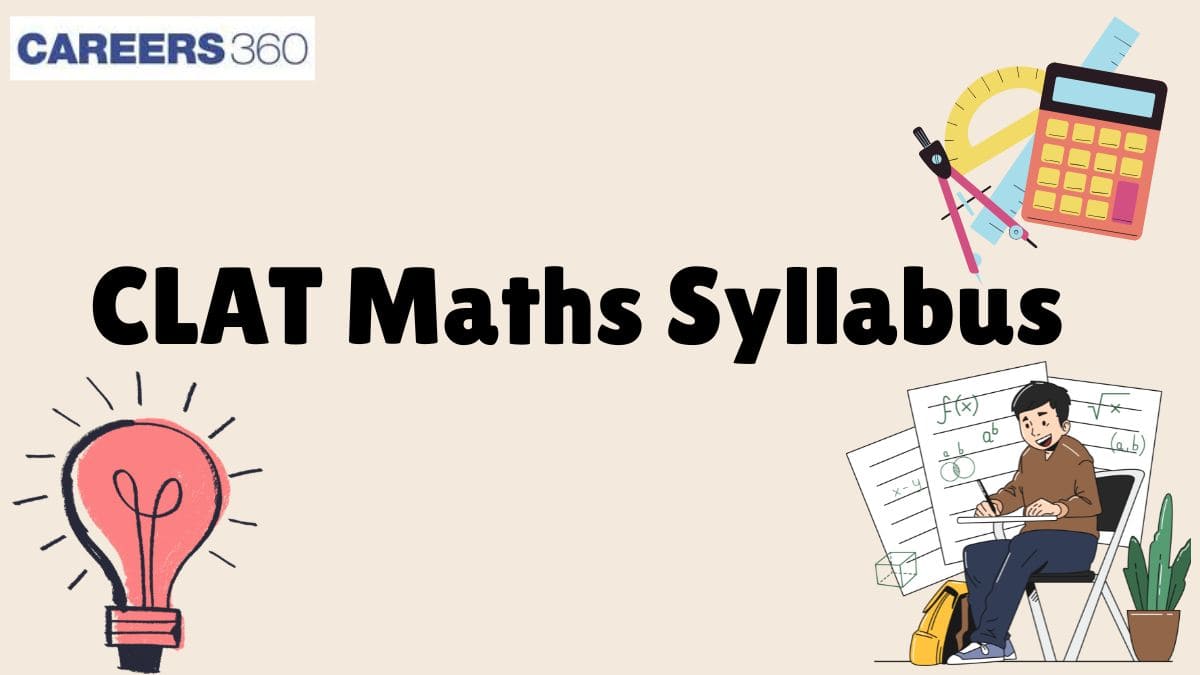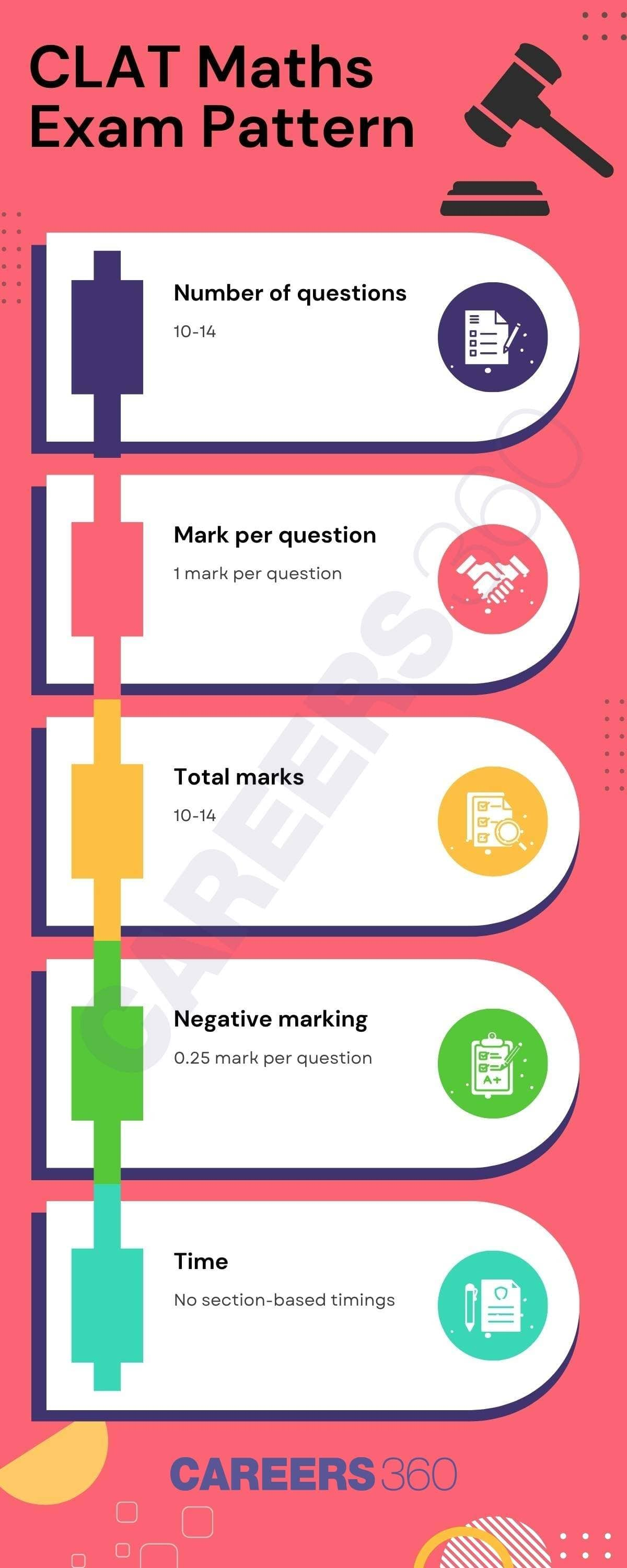Jindal Global Law School Admissions 2026
Ranked #1 Law School in India & South Asia by QS- World University Rankings | Merit cum means scholarships | Early Admissions (Pahse 2) Deadline: 28th Feb’26
The Consortium of NLUs (CNLUs) shares the CLAT Maths 2027 syllabus on its official website - consortiumofnlus.ac.in. The CLAT quantitative techniques syllabus 2027 will have a 10% weightage in the CLAT 2027. The quantitative techniques section will feature short sets of facts or textual/ numerical data, followed by questions requiring basic mathematical application. The maximum difficulty level of the CLAT maths syllabus 2027 is of class 10th grade, as it includes mathematical concepts such as ratios, proportions, mensuration, algebra, and statistical estimation. This section tests the candidate’s ability to reason with numbers and apply quantitative logic, an important skill in evidence-based legal analysis. Read on to find out all the details on the syllabus of CLAT Maths 2027, including important topics, preparation tips and more.
This Story also Contains

The CLAT syllabus for maths carries the least weightage in the CLAT 2027 syllabus. However, it is a tricky section which can make a big difference in the overall CLAT score. Preparing well for the CLAT Maths 2027 syllabus can enable the candidates to clear the CLAT cut offs for top NLUs. The Common Law Admission Test will be conducted in offline mode.
Particulars | Details |
|---|---|
Weight | 10% |
Type of questions | MCQs |
Number of questions | 10-14 |
Skills tested | Working with numerical data and performing class 10 mathematical operations. |
The CLAT quantitative techniques syllabus 2027 requires the candidate to work with numerical data and derive appropriate inferences and conclusions. There will be 2-4 passages which contain short sets of facts or propositions, or other numerical information presented in textual form. The passages will then be followed by objective questions based on the data given in the passage.
In order to answer the questions in the CLAT Maths syllabus 2027, candidates may have to perform arithmetic operations, manipulations, and derive inferences. Candidates may also have to apply mathematical operations of up to the class 10 level to solve the questions.
Basic Arithmetic: Basic mathematical operations such as addition, subtraction, division and multiplication.
Ratios and Proportions: Calculating the percentage increase or decrease and the relationship between given variables. Includes working with fractions.
Basic Algebra: Algebraic operations at a class 10 level
Mensuration: Includes topics on measurements, volume and geometry
Statistical Estimation: Making interpretations about the various possible results from a given set of data.
Profit and Loss: Calculating the gains made and losses incurred on buying and selling.
Time and Work: Problems in calculating the work completed and the days required to complete the work by a given number of workers
Speed, Time and Distance: Calculating one among the three variables of speed, time and distance when two others are given.
Probability: Calculating the possible chances of occurrence of a particular outcome
Ranked #1 Law School in India & South Asia by QS- World University Rankings | Merit cum means scholarships | Early Admissions (Pahse 2) Deadline: 28th Feb’26
Among top 100 Universities Globally in the Times Higher Education (THE) Interdisciplinary Science Rankings 2026
The CLAT 2027 quantitative techniques section will have 10-14 multiple-choice questions. Each question carries 1 mark. There is also a negative marking of 0.25 marks for every wrong answer.
Particulars | Details |
|---|---|
Number of questions | 10-14 |
Total marks | 10-14 |
Marks per question | 1 |
Negative marking | 0.25 mark for every wrong answer |

| Year | Section Details | Difficulty level |
|---|---|---|
| 2021 | Questions on simplifications, profit and loss, income and expenditure, percentages, ratios, and average | Moderate |
| 2022 | 2 questions from ratio and proportion, and one from percentage | Easy |
| 2023 | 3 sets of passages with 15 questions in total | Easy to moderate |
| 2024 | 2 passages with 12 CLAT Maths questions on topics such as arithmetic, ratio and proportion. | Easy to moderate |
| 2025 | 2 passages with 12 questions on topics like budget, profit and loss, interest, income and expenditure, percentages, ratios, and average | Easy to moderate |
You may also check -
Last Date to Apply: 25th Feb | Ranked #18 amongst Institutions in India by NIRF | Ranked #1 in India for Academic Reputation by QS Rankings | 16 LPA Highest CTC
India's Largest University | BCI approved | Meritorious Scholarships up to 5 lacs |
The CLAT 2027 maths syllabus can be tough for students who are not from the science stream. However, it is important to understand that the difficulty level of the CLAT maths questions is not greater than Class 10th. Candidates to have elementary knowledge of mathematics and some class 10 mathematical concepts from algebra and mensuration. The 10% marks in the CLAT maths syllabus 2027 can help well-prepared candidates outperform others and get a good score in CLAT that is well above the cut-off for top NLUs.
The CLAT 2027 is open for candidates from non-science and non-mathematics backgrounds as well. So, preparing with a special focus on the CLAT maths syllabus 2027 can give candidates a competitive advantage over others in the exam. Given below are a few tips on preparing for the CLAT 2027 quantitative techniques that aspirants can make use of.
Candidates must work on developing a good theoretical understanding of the concepts covered in the CLAT maths syllabus. They can refer to good mathematics books to build a good foundation in the topics.
The theoretical understanding must be complemented with a practical approach by repeatedly solving problems that are based on the underlying mathematical concepts. Maths is learnt more by doing than only reading.
The third tip to do well in CLAT quantitative techniques is to apply mathematics in everyday life. Aspirants must resort to performing manual calculations instead of using a calculator to boost calculation speed.
Solving CLAT 2027 sample papers can make candidates comfortable with the CLAT Maths 2027 paper pattern. It can also let them know where they stand in terms of the level of preparation.
Candidates must practise speed reading to improve reading and comprehension speed and save time during the exam. The CLAT Maths questions will be in the form of a short set of textual passages followed by a question.
You may also check - CLAT Maths Questions with Solutions
Given below is a list of books for CLAT Maths 2027 with which candidates can prepare for the CLAT 2027 mathematics syllabus.
Sr No. | Book Name |
|---|---|
1 | Quantitative Aptitude by RS Aggarwal |
2 | Fast Track Objective Arithmetic by Arihant Publications |
3 | Elementary Mathematics with Numerical Ability by Prateek Jain |
4 | Quantitative Aptitude for Competitive Examinations by Pearson's |
5 | Class 10 NCERT Maths textbook |
You may also check -
| Commercial Law | Civil Law |
| Comparative Law | Consumer Law |
| Constitutional and Administrative Law | Business Law |
| Corporate Law | Banking Law |
| Criminology and Forensic Law | International Trade Law |
Frequently Asked Questions (FAQs)
The level of Maths in CLAT is of class 10 difficulty level.
The CLAT Maths syllabus 2027 may come across as difficult for students from a non-science background. The CLAT Maths section tests the basic elementary mathematics required up to class 10 and requires constant practice to improve solving speed.
In CLAT Maths 2027, there will be 10-14 questions.
On Question asked by student community
Since you have not specified your category, I will answer for all categories. A CLAT rank of 38169 (typically 40-45 marks) makes admission to top NLUs difficult. For General candidates, chances are nil. Even for OBC, SC, and ST categories, admission is primarily possible only through state domicile quotas or
After the CLAT results are declared, candidates participate in a centralised online counselling process managed by the Consortium of NLUs. Eligible candidates register on the official portal, submit their NLU preference list , and pay a counselling fee. Seat allotment happens across multiple rounds based on rank, category, and preferences,
Hi, you can apply for admissions in Nirma University, NFSU Ahemdabad, Alliance, IPU University and affiliated instiutes (in case you are reserved category candidates), UPES Dehradun, BITS Law School etc.
Start preparing for CLAT by first understanding the exam pattern and syllabus, which includes English, Current Affairs, Legal Reasoning, Logical Reasoning, and Quantitative Techniques. Make a simple daily routine and begin with basics read newspapers regularly for current affairs, practice comprehension passages for English and legal sections, and solve basic
Hello,
With a CLAT AIR of 33599 and SC category rank of 2103, and being a Delhi domicile, your chances at IP University (GGSIPU) are moderate to good, especially in later counselling rounds.
Based on previous year trends, some IPU-affiliated law colleges have closed at higher SC category ranks, so
Among top 100 Universities Globally in the Times Higher Education (THE) Interdisciplinary Science Rankings 2026
NAAC A+ Accredited | Among top 2% Universities Globally (QS World University Rankings 2026)
Excellent curriculum; an impressive range of electives, besides core law courses. Up to 100% merit scholarship on a first-come, first-served basis
Moot Court | Mock trials | Legal Aid Clinic
Admissions open for B.A. LL.B. (Hons.), B.B.A. LL.B. (Hons.) and LL.B Program (3 Years) | School of Law, MRU ranked No. 1 in Law Schools of Excellence in India by GHRDC (2023)
NAAC A++ Accredited | Ranked #11 by NIRF